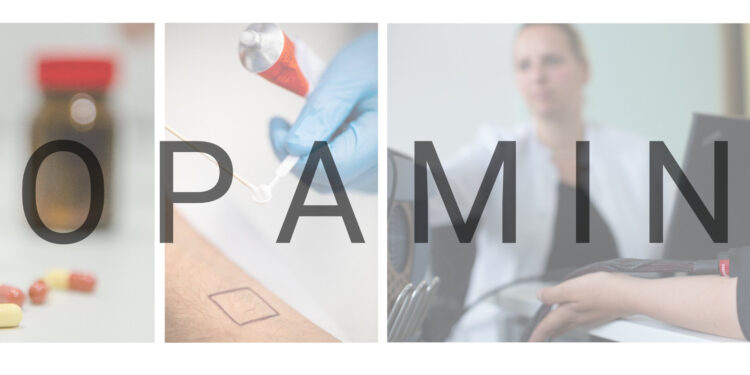Does dopamine determine how strong the pain relief we expect from an analgesic – and does it determine how effective the treatment is? Credit: Livia Asan (CC-BY 4.0, creativecommons.org/licenses/by/4.0/)
New findings contradict a direct causal role for dopamine during the experience of a treatment effect in establishing positive treatment expectancies and placebo analgesia in healthy volunteers, according to a study published September 24 in the open-access journal PLOS Biology by Ulrike Bingel of the University Hospital Essen, Germany, and colleagues.
Dopamine-based reward and learning mechanisms have been suggested to contribute to placebo effects. However, the exact role of dopamine, a brain messenger molecule, in their generation and maintenance is still unclear.
To fill this knowledge gap, Bingel and colleagues examined the causal role of dopamine in the expectation of positive treatment effects, as well as the magnitude and duration of its effects on pain.
To this end, they used an established paradigm of placebo pain relief in combination with two opposing drugs to alter brain dopamine levels, namely the dopamine antagonist sulpiride, the dopamine precursor L-dopa, and an inactive pill with no drug as a control, which were applied in an experimental, double-blind, randomized, placebo-controlled trial involving 168 healthy volunteers.
The study drug successfully altered dopaminergic tone during the conditioning procedure. Contrary to the hypothesis, the drug did not modulate the formation of positive treatment expectancies and placebo analgesia tested one day later.
Placebo analgesia was no longer detectable by day 8 after conditioning. Overall, the data provided strong evidence against a direct dopaminergic influence on the generation and maintenance of placebo effects.
The results suggest that, although dopamine is obviously not necessary to establish placebo analgesia, some dimensions of dopamine-dependent reward processing, which are more related to active agency and motivational aspects, may still interact with the experience of pain.
Furthermore, the results contribute to a more nuanced understanding of the neurobiology underlying placebo analgesia, which helps characterize the complex interplay between cognition, neurochemistry, and treatment outcome.
According to the authors, further exploration of the neurochemical mechanisms underlying placebo analgesia remains paramount in the quest to harness these effects for optimal therapeutic outcomes.
In particular, future efforts aimed at advancing the understanding of dopaminergic mechanisms modulating the response to pain processing must take into account the undoubtedly complex involvement of dopaminergic neurotransmission in pain and its modulation.
The authors add: “Our research is motivated by the desire to target the underlying mechanisms of placebo effects to make active medical treatments more effective. The results of our study contribute to reorienting the search for new therapeutic targets to achieve this goal.”
More information:
Dopamine has no direct causal role in the formation of treatment expectations and placebo analgesia in humans. PLoS Biology (2024). DOI: 10.1371/journal.pbio.3002772
Provided by the Public Library of Science
Quote:A randomized trial examines the neurochemical underpinnings of the placebo effect (2024, September 24) retrieved September 24, 2024 from
This document is subject to copyright. Apart from any fair dealing for the purpose of private study or research, no part may be reproduced without written permission. The content is provided for informational purposes only.



